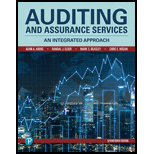
Auditing And Assurance Services
17th Edition
ISBN: 9780134897431
Author: ARENS, Alvin A.
Publisher: PEARSON
expand_more
expand_more
format_list_bulleted
Question
Chapter 10, Problem 7RQ
To determine
Identify the role of professional skepticism in classifying the intentional and unintentional misstatement.
Expert Solution & Answer
Want to see the full answer?
Check out a sample textbook solution
Students have asked these similar questions
None
Boom Lay Corp, has a current accounts receivable balance of $327,815. Credit sales for the year just ended were $4,238,720. What is the receivables turnover? What is the day's sales in receivables? How long did it take on average for credit customers to pay off their accounts during the past year?
Hi expert provide correct answer general accounting
Chapter 10 Solutions
Auditing And Assurance Services
Ch. 10 - Prob. 1RQCh. 10 - Define misappropriation of assets and give two...Ch. 10 - Prob. 3RQCh. 10 - Prob. 4RQCh. 10 - Prob. 5RQCh. 10 - Prob. 6RQCh. 10 - Prob. 7RQCh. 10 - Prob. 8RQCh. 10 - Prob. 9RQCh. 10 - Prob. 10RQ
Ch. 10 - Prob. 11RQCh. 10 - Prob. 12RQCh. 10 - Prob. 13RQCh. 10 - Prob. 14RQCh. 10 - Prob. 15RQCh. 10 - Prob. 16RQCh. 10 - Prob. 17RQCh. 10 - Prob. 18.1MCQCh. 10 - Prob. 18.2MCQCh. 10 - Prob. 18.3MCQCh. 10 - Prob. 19.1MCQCh. 10 - Prob. 19.2MCQCh. 10 - Prob. 19.3MCQCh. 10 - Prob. 20.1MCQCh. 10 - Prob. 20.2MCQCh. 10 - Prob. 20.3MCQCh. 10 - Prob. 21.1MCQCh. 10 - Prob. 21.2MCQCh. 10 - Prob. 21.3MCQCh. 10 - Prob. 22DQPCh. 10 - Prob. 23DQPCh. 10 - Prob. 24DQPCh. 10 - Prob. 26DQPCh. 10 - Prob. 27DQPCh. 10 - Prob. 28DQPCh. 10 - Prob. 30DQPCh. 10 - Prob. 31DQPCh. 10 - Prob. 32DQPCh. 10 - Prob. 33DQP
Knowledge Booster
Similar questions
- Dave Ryan is the CEO of Ryan's Arcade. At the end of its accounting period, December 31, Ryan's Arcade has assets of $450,000 and liabilities of $125,000. Using the accounting equation, determine the following amounts: a. Stockholders' equity as of December 31 of the current year. b. Stockholders' equity as of December 31 at the end of the next year, assuming that assets increased by $65,000 and liabilities increased by $35,000 during the year.arrow_forwardBoston Products has a production budget as follows: May, 19,000 units; June, 22,000 units; and July, 27,000 units. Each unit requires 2.5 labor hours at $10 per hour. What would be the budgeted direct labor cost for June?arrow_forwardBoston Products has a production budget as follows: May, 19,000 units; June, 22,000 units; and July, 27,000 units. Each unit requires 2.5 labor hours at $10 per hour. What would be the budgeted direct labor cost for June? I'm waiting for Answerarrow_forward
arrow_back_ios
SEE MORE QUESTIONS
arrow_forward_ios
Recommended textbooks for you
- Business/Professional Ethics Directors/Executives...AccountingISBN:9781337485913Author:BROOKSPublisher:Cengage
 Auditing: A Risk Based-Approach (MindTap Course L...AccountingISBN:9781337619455Author:Karla M Johnstone, Audrey A. Gramling, Larry E. RittenbergPublisher:Cengage Learning
Auditing: A Risk Based-Approach (MindTap Course L...AccountingISBN:9781337619455Author:Karla M Johnstone, Audrey A. Gramling, Larry E. RittenbergPublisher:Cengage Learning Auditing: A Risk Based-Approach to Conducting a Q...AccountingISBN:9781305080577Author:Karla M Johnstone, Audrey A. Gramling, Larry E. RittenbergPublisher:South-Western College Pub
Auditing: A Risk Based-Approach to Conducting a Q...AccountingISBN:9781305080577Author:Karla M Johnstone, Audrey A. Gramling, Larry E. RittenbergPublisher:South-Western College Pub

Business/Professional Ethics Directors/Executives...
Accounting
ISBN:9781337485913
Author:BROOKS
Publisher:Cengage

Auditing: A Risk Based-Approach (MindTap Course L...
Accounting
ISBN:9781337619455
Author:Karla M Johnstone, Audrey A. Gramling, Larry E. Rittenberg
Publisher:Cengage Learning

Auditing: A Risk Based-Approach to Conducting a Q...
Accounting
ISBN:9781305080577
Author:Karla M Johnstone, Audrey A. Gramling, Larry E. Rittenberg
Publisher:South-Western College Pub
